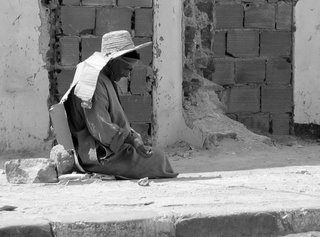Ramadan began last Sunday on the 24th in accordance with the new lunar cycle and will last 30 days. In Saudi Arabia, it began the day before. I’ve been staying with my host family in the evenings to accommodate the schedule, but have also broke fast with 3 other families. Here’s a daily schedule during Ramadan.
6 PM Following call to prayer, fast is broken with prayer and meal iftar
630-8 Primetime TV (4 comedies including bloopers on 2M.)
8-9 Men go to mosque for prayer
9-12 Snack, play cards, TV, etc
12 AM 2nd meal
1230-4 Sleep, talk, play cards, etc
4 AM Breakfast
4 AM-6 PM Sleep, work, etc
Ramadan’s most important feature is the complete abstinence from food and drink from daybreak to sunset. All muslims fast, but travelers, menstruating women, the sick, and the pre-pubescent are exempt. Non-muslims are not expected to fast, but I’ve found its appreciated and an important integration tool at my site. I did not fast the first day; we were traveling and I woke up late.
A good introduction to Ramadan can be found in Riverbend's "Baghdad Burning."
“The most active part of the whole day is the quarter of an hour directly before breaking the fast... the whole family is often in a flurry of action, with someone setting the table, someone carrying the food, someone giving orders about where to put everything... and everyone impatient with hunger. The last five minutes before you hear the call for prayer signifying the end of the fast are always the most difficult. Every second of those last five minutes passes with the heaviness of an hour... you can literally see every one strain to hear the sound of the call for prayer echoing through the Baghdad streets. And then it is finally time for futtoor... and we begin to eat with relish. The platter of rice that seemed ridiculously small 15 minutes ago, is now ‘too much’ and no one eats as much as they had hoped they were going to eat- everyone is exhausted with simply contemplating the food, the choices and the possibilities. After futtoor, the smokers fall upon their cigarettes with an enthusiasm only other smokers can appreciate. We watch them taking puff after puff with a contentment that even screaming kids, and loud televisions cannot taint.”
The previous is true, although smoking is less public and prevalent in my small site. The wrath from some women here might be worse than any physical withdrawal.
I had some anxiety before fasting began. No food intake was not a problem, but I found no drinking unpalatable. Its hard to shake thirst. A few Moroccans like my host brothers sleep through most of the day, but most maintain their daily activities. I feel sorry for those in tourism or the restaurant industry.
Overall, Ramadan is a joyous event. Fasting during the day is to reinforce one’s commitment to faith and to develop appreciation for ones good fortune. Breaking fast and the time spent together in the evenings is a celebration of the gathered family.
“When food is shared and laughter is abundant, family exists.”
















